
Cult Presents: Sherlock Holmes - Printer Friendly Version
The Deer Stalker by Paul Cornell
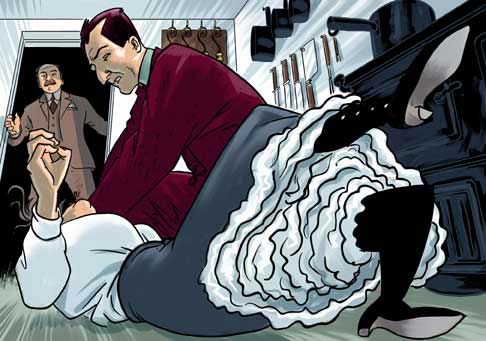
From the Journal of Dr. John H. Watson:
I write as best I can, in this darkness, illuminated only by a grating to the street. Holmes has disappeared, lost of his own accord. I have done my best to follow his example, if not his person. I could not leave London, but I feel sure that he has. I think I know where he has gone. It is best, at this point, if we are not together.
I sit alone in a wine cellar, the second level of a coal cellar beneath a building which has been sold but into which a tenant has not yet moved. It is the kind of abode found by beggars. But it is a situation that I have mentioned nowhere in my writings, and which therefore I hope may remain unknown to those that seek me.
I hear some of the noises of London life continuing above me and outside. Things are perhaps more quiet than they should be. The inhabitants are wary, hungry for news, aware of the attacks on myself and on my friend, and anticipating another outrage, while understanding the nature of the raids. I am gambling the lives of all those folk that no assault will find me here. None of these buildings could hope to withstand the weapons these bandits have at their command.
Holmes will surprise the pirates. They will not find him, he will find them, as he has done so many times before, and this time he will not fall into their trap. I know his methods. I have faith in them and in him.
I must embark upon my account, fragmentary as it is, for the sake of history. Let others... I pray, let Holmes, if you are reading this, dear friend... make sense of it.
I do not know where it began. But I shall begin it with Mrs. Hudson having her fit.
I had entered 221B to no greeting from Billy or from Holmes' housekeeper, the door being surprisingly open, and had made my way to the kitchen upon hearing a noise.
Holmes had his fingers in Mrs. Hudson's mouth as she thrashed to and fro. His form was pressed up against hers in the corner of the room. She made noises like an animal, and was spitting blood, both his and her own.
I quickly took her from him, and assured him there was no possibility of her swallowing her tongue. I placed her in a more secure posture on the floor in order to check her vital signs.
"It is intolerable," Holmes muttered, absently holding his white, bitten hand. "When she entered this state I had no knowledge of what to do, I could only guess. What good could I have been to her? Tell me, have I even injured her?"
I was about to reply in the negative when a thin sound escaped the lips of the pathetic woman. "They're through," she said. "They are here."
I paid her no heed, taking her words to be the meaningless spasms of the organ of thought in crisis. "I shall send a message to St. Luke's, and I will make sure there is a bed for her at once."
"'They are here.' What can she mean?" asked Holmes, rhetorically, his face still a portrait of compassion. "Nothing for us, but perhaps everything for her."
That, I am sure, was the point. The point where Holmes, and the world, started to be wrong.
***
The next few days were busy for me, both looking after my own practice, going home to my... no, to one of the poor women that I have, in the course of these narratives, referred to as "my wife" but who the world would doubtless refer to as... I shall use the word and rely on your tact, old friend, as I slowly realised during our acquaintance I must always have relied on it in this matter... 'a dollymop'. Yes, there, it is out. I shall not drag her name into print. I do not wish to make a character out of her. Let them make of that not what they will but what I make of it, which is that I loved her... But I must not divert myself. I also spent time seeing that Mrs. Hudson got the best treatment available to her.
Holmes I saw little of. I assumed, by the cries of the newspaper sellers, that his thoughts would be taken with the latest outrage they described, a new series of murders committed in a style quite similar to those that had baffled the police in the latter months of 1888. At that time, Holmes had kept his distance, thinking in a brown study but never leaping to his feet with the quarry in his sights. I, and others of my profession and acquaintance, convinced the killer was a medical man, or a man of science, awaited such a move most hopefully, but it had never come.
Perhaps it was that these squalid, meaningless murders,were unworthy of Holmes, the creations of pathology rather than the superior intellects he was used to matching wits with. Indeed, this time the killer was being bolder than ever: seen running from the scenes of his crimes, heard laughing, noted by many observers as being dressed like a gentleman. It was as if he had decided to live up to the inflated accounts of himself that were the lifeblood of the penny dreadfuls. And such arrogance in the face of the law would, all thought now, surely sooner or later lead to arrest. It was astonishing that the police had not caught him already, leading me to think that there was perhaps another dimension to this man and his deeds, a dimension that would be a matter for my friend's intellect.
It was with this in mind, eager to discover Holmes' thoughts on this matter, that I returned to his rooms a week or so after Mrs. Hudson's visitation.
My finger was on the bell when something made me turn.
Perhaps there had been a sound. If there was, I cannot recall hearing it.
There was only darkness against darkness in the building overlooking my friend's rooms, on the other side of Baker Street. But by one particular window, the shape of that darkness had changed.
I give myself credit for my actions now. I looked back to the door and pressed the bell, for all the world as if I had only been breathing deep of the late November air. I waited, my senses stirred to a pitch of battle, as Billy opened the door and bade me enter, and even waited a moment as he closed the door behind me.
Then without shedding my coat and hat I ran up the stairs to my friend's room that faced onto the street, ran like the devil was on my heels!
The light of the lamp was on. I could hear Billy crying out behind me.
I burst into the room. "Holmes!" I shouted.
The shot came through the open window. It blew the stuffing out of the pillow that stood atop the hatstand.
I threw myself to the floor and bellowed as Billy opened the door. "Stay there, boy!"
But the boy entered the room, breathing not only from his run but from the emotional faith that my friend inspires in all those who know his methods. "Mr. Holmes' complements, sir," he said. "And could you be joining him on the top floor of the house opposite. The door is open."
***
I was later to discover that the round that had passed through the window had flattened itself against the hardwood of one of Holmes' bookshelves barely an inch from my ear. And the intuition of that fact followed me down the stairs and into the street. I took a moment to catch my breath before venturing into the second rate townhouse opposite.
I found Holmes standing at the window of what looked like it had once been a library, or a study similar to his own. Beside him lay a rifle of extraordinary construction: it was a slim beast, with sights the memory of which even now confounds me.
"Good Lord, Holmes," I said. "What has happened here? Was I the target, or -?"
"No, Watson. It was I. I had become aware of certain trends within the underworld, a movement of Cubans through the docks, Italians, Bolsheviks... So I contrived a trap, as I did once before. However... somehow our assassin has contrived to elude me. And I am at a loss to explain how."
He listened with interest to my account of being shot at.
"A second assassin, in one of the other houses, while the promise of a first lured me here. The aim from this window covers the street. See, it is impossible to fire successfully through my window from here."
"So I was their target?"
"If you truly were, old friend, I suspect you would be dead. No, this is a feint, a poke in the ribs. And from someone who knows of our history, eh? You have mentioned the incident I referred to in your accounts, have you not?"
I allowed that I had.
Holmes directed me to examine the weapon.
I must confess I flinched at the sudden closeness those extraordinary sights provided. "Holmes, this rifle, I have never seen the like."
"No," said Holmes, his eyes locked on the distance. "Neither have I."
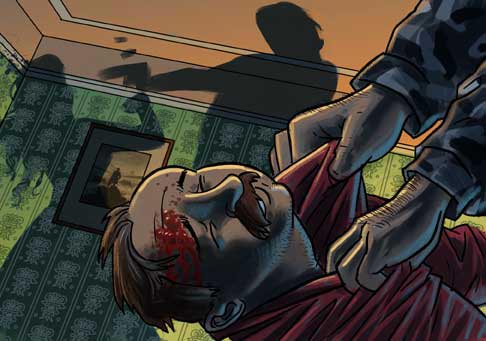
I stayed with him over the next two days as he paced and thought and looked through endless books, comparing every part of the rifle to his indices of weapons and their manufacture.
"I see its heritage," he said at one point, "in the weapons I observe today. Like one who is skilled in such things may look at the weather and say what conditions will be a day or a year hence."
"Holmes, what do you mean?"
"It is a 6.5mm military carbine, probably of Italian manufacture, but I do not know if I may class those inferences as facts, for facts are occurrences, and... come, you will see." He beckoned me over to his microscope, and bade me look into it. I brought into focus a tiny part of the firing mechanism that had been imprinted with a name: Mannlicher � Carcano, and a date �
Once more, I leapt back from a sight. "Holmes, this must be a misdirection, a mirage designed to throw off your aim. It makes me think of �"
"Myself also, Watson, but he is dead. And even he could not alter the world to his whim. That date is real." He walked back to the sideboard, and began to stuff his pipe.
***
That night I stayed with the woman I have previously mentioned. She was a typist, who made a poor living which I was pleased to supplement on an exclusive and voluntary basis.
I felt appropriate guilt, obviously, but in the early hours of that morning, it was as if guilt had reared up out of my sleep and found me out.
I was suddenly awake, and a terrible sound was shaking the building from top to bottom, as if a train were passing. I could hear cries from other abodes within. I went to the window. There were lights up in the sky! I crossed myself. My darling was at my side then. I told her to dress, that we would make our way at speed to � I was about to say to 221B, and hang all decency, or... I do not know, perhaps I was more prudent and said we would find my consulting rooms.
A dark shape was suddenly between me and the light. It moved towards me - Someone was outside! The window shattered.
My narrative breaks here. I do not recall the rifle butt clubbing me to the ground. I was told of it.
I am sure, however, that I heard the struggle and the two shots that made it cease.
***
Strange hands slapped my face. I called aloud for my darling. I opened my eyes.
I was sitting beside a dark figure. He had the eyes of the devil. With him sat other figures. It took me a moment to realise that I could understand them, and that they knew my name and were speaking to me. They were shouting above the same great noise that I had heard above the building where warmth and love had lived so distantly now.
I turned to find my darling. And saw that we were high above the city. I had never seen the like. I have never ascended in a balloon. The lights! The somber mass of parliament! The great darkness of the river!
But I had no joy in that sight then. I was out of control, yelling threats and insults. They were telling me she was dead! That they had shot her! The villains, oh the villains!
They had enough of me then. They took me to the back of their craft, opened a door that seemed too small to be a door for men, and threw me inside.
A match was struck, and Holmes was looking at me from a bare wooden bench. He showed small signs of violence on his person.
"Watson, so they have you also! I thought I had tracked them down, but they were prepared for me, they sprang a trap! Imagine that! What is your condition? You must bear up, old fellow, we are attacked!"
It took me a moment to answer him. "I shall bear up with the intent of fighting," I finally whispered, keeping the passion from my voice as best I could.
He must have understood about her, about the loss of her, from everything about me. It is hard to have secrets from such a man, and at that moment I had none from anyone.
"Good fellow," he said gently. "I have had much to observe, perhaps too much, and I have come to some conclusions. They are raiders, a small party, though their arms belie it. They do not come to conquer, but to plunder, and I believe their plunder is, uniquely, us!"
At that point my narrative breaks again, into unconsciousness, and I can only suppose I have my friend to thank that there was not an end to it.
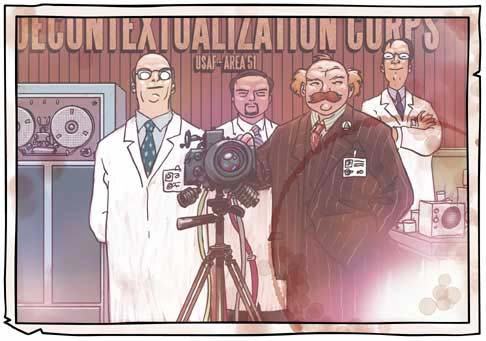
I woke once more inside what I immediately recognized as a military tent. Holmes had opened a bottle of smelling salts under my nose.
"We are somewhere in Surrey," he whispered. "A clearing in the woods near a small town. I should think it is Dorking, I have seen a spire which may well be St. Martin's. There is but one tent, and I have counted four of these pirates, including two ladies, one of whom is a child. But do not be fooled. They are armed to an extent I have never seen."
The ragged group who stood around us parted, as one entered who was obviously their commanding officer. He was thin, with very short dark hair, presented in a stark parting. He stood like a soldier, but any scientist would have declared that his face was that of a criminal. He carried the rifle I had last seen in Holmes' study, the very one, I was certain. Though the weapons his fellows had with them made it look simple.
"Lee Oswald," he said, his voice high and reedy, "you, Mr. Holmes and you, Dr. Watson, I'm your best friend. I'm here to set you free."
I gathered that he did not mean he was going to release us.
Holmes stood to face him. "You imagine you have us at a disadvantage, sir, but perhaps I know rather more about you than you imagine. You have spent some time in Russia. You are happily married to a woman of foreign descent, and were apprenticed to a carpenter."
Oswald laughed. "Close, but not quite right. I guess you've heard something in my accent, which is kind of a mongrel's bark. Got a lot of disappointment in it, while you sound like you own the world. Where you're wrong is, you've seen something about my hands. I just like playing with the skin with my knife a little, just toughening it up. Just the way I am. Doesn't mean anything. Not a lot about me does anymore."
On a handful of occasions I have seen my friend confounded. Rarely have I seen him so lost as he was in that moment.
"Perhaps you would be good enough to inform us of your purpose?"
"Like I said, we're here to free you. Like me and the other guys have been freed. That's Vlad over there, the Count, some days he likes us to call him Dracula."
"Dracula is a fictional character, he is not real," said Holmes.
"And these are Calamity Jane and Alice."
So I recognised three of this group. Calamity Jane was the female scout, the hero of Goose Creek Camp, just a few years ago. Here she looked most strange, with blonde ringlets and a cavalry hat. She carried a vast cannon that would have looked obscene in any hands, let alone those of a lady. And little Alice... was this the Alice from the fiction of Lewis Carroll? The mean face and heavy armament of the small child spoke of a vast distance from the quaintness of that work.
"Interesting," said Holmes. "I believe you are not heavily armed delusionals. So what are you?"
"Where's his deer stalker?" Oswald had rudely turned to interrogate the others. "We've got his violin, his pipe, his magnifying glass..." I noted that he counted these objects onto a table from a bag. "Didn't he have it with him when you sprang the trap?"
"He was as you see him now," said Dracula, in an extraordinary accent.
Holmes stared at them. "Are you referring to a hat? I do own one, but of what relevance -?"
"We have a list of what makes you yourself, Mr. Holmes. We're going to need the hat. We've successfully targeted Professor Moriarty, and you should see him now, the big changes now he's been freed..."
"What?" I blurted. "You confirm, I take it, that he lives?"
"Yeah. And what's happened to him, it's so obvious. I didn't realise until I'd caught him with the device. The top hat and the opera cape, that's what did it. It took a struggle to get him into them, but it really paid off."
"Are you seriously suggesting, sir," said Holmes, "that the content of one's character is determined by the hat on one's head? The deer stalker is worn only by someone in the countryside who wishes to go out in the rain."
"You know that expression, �never let the facts get in the way of a good story"? Well you just did that, mister. Not your fault. It's the times you live in. The times everybody lived in until I came along. I guess maybe that's why they chose me. To be the guy that does the freeing. The inventors of this little doohickey, I mean. It zaps you, kind of exposes you to all the random stuff out there, frees you, like I said. What comes out the other side... it ain't what you'd call random, you can see a method in the madness, but us guys who got zapped... it's stuff we'd never have thought of for ourselves." He went over to a table and picked up a strange-looking weapon, a bulky silver barrel with sights and a trigger mechanism.
"I got experimented on in jail, right after they faked my death. The Decontextualisation Corps, they called themselves. They looked the part: white coats and pipes, or Germans with fuzzy hair. They didn't tell me much, just that I was going off into some other world. Or rather worlds. That I was going to be cut out of history and made into something bigger, something that would run and run. Now I've always got this rifle with me, yeah, this one here that I used to make you interested, to make you come after us. It always comes back to me. And I'm always kind of skinny, but you should see how the rest changes! Some days I wake up a Commie, some days I'm from outer space, hey, some days I'm even innocent!"
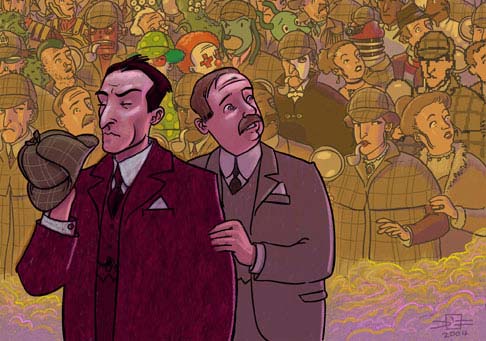
"Good Lord, Holmes," I whispered.
"Hey, I love that! Do that again! That's you all over!" laughed Oswald. "And that part's gonna stay, boy, the big details do. But the rest: one zap with the device and you're anything to anybody. That's my mission. I scout around fiction, zapping people, making them like me: easy to understand, what anyone wants them to be. That's the way my bosses like it, who knows why? Another world to conquer, I guess. I have to pick who I do it to, though. Some of them just won't take. You know, the average man in the street? You can't take the man out of the street, you can't take the street out of the man. But don't worry, Mr. Holmes: you're the centre of this world. Nobody remembers much about this place apart from you. From here, it's you, Watson, Moriarty, and who cares about the rest? We're the lucky ones who get to be all the different versions of ourselves. Every idea of us that anyone's ever come up with. For instance, you'll be stupid while Watson is intelligent �"
"Watson is intelligent."
"Sure, sometimes that's fashionable. Then it's gone again. Sometimes you'll be queer, because being a bachelor is kind of odd."
Holmes' face was a picture.
"You will meet creatures from space, you will be American, Canadian, German, travel through time to meet Sigmund Freud, be two dogs in costume, robots, cartoons, computer doohickeys come to life. You'll always be kind of eccentric �"
"I am not eccentric!"
"Cut off from this world of yours, I'd say you are. A guy in a deer stalker. That's what people remember. That's why we need it. To zap you properly. I love doing this stuff. The guys here love it too, now I've zapped them and set them free."
"We've come out of the rabbit hole," said Alice.
"Why be vun when you can be two, two, or three, three different people?!" laughed the Count, suddenly affable.
"So," summed up Oswald, "we're gonna keep Holmes here until we can get a hold of that hat. Alice, you can go find a milliner tomorrow. But Dr. Watson," he hefted the machine in my direction. "You can join us right now."
I braced myself to move. I swear I would have attacked him, weak as I was. But there came a sudden dislocation of events, as often I have experienced in war. Everything happened at once, that's what writers such as I say at this point. Holmes would point out that that was simply incorrect.
There were shouts, and shots, and explosions, and a sudden ripping noise.
A cavalry saber through fabric.
A carbine was shoved through the gap and fired.
It missed Oswald, who was already firing, his brigands with him.
A horse burst into the tent, its flanks flaring with blood and flesh as the guns that fired too fast blasted it apart. But on its back was a Dragoon, firing back even as he fell, and behind him was another and another.
I have since learnt that they had left barracks and galloped through the streets of Dorking, forming up through shouted orders and the calls of onlookers in windows. There had been a great charge of them, straight at this encampment in the woods, the moonlight off their sabers matching the stark white lights that Oswald's pirates had erected.
I have heard that eight in ten of them were cut down, by devices launched on the perimeter of the camp.
The tent collapsed, and something caught me on the side of the head once more.
I saw Holmes look at me with concern, his face had an expression of decision on it. And then I saw nothing more.
***
I woke in the Dragoon barracks.
They had surprised Oswald's men enough to force a swift retreat. Their craft had taken them off, but had not been tracked as well by astonished observers as it had in its flight to Dorking.
I knew I had to leave. I took a train to London, having wired ahead to some friends in the major hospitals. When I got there I received word that what I feared was so, that my darling was indeed gone, the victim of two bullets when she tried to prevent them manhandling me out of the window.
I visited her home and saw what was left. And then I knew not what to do. Holmes, I was sure, had left me to save me. He was Oswald's main quarry. Surely, he would attempt to take the brigands somewhere out of the city, where the pursuit would be a contest between them and him and not cost innocent lives?
He might subtly suggest to them a place where he might be found, somewhere featured in my writings, and then turn the tables.
I could not return home, or go to my practice, to places where they would know to find me. I could not stay in the streets I had often described. I was sure, with the inventions they had to hand, that they could find me there too.
So I found my abandoned place of darkness, broke in, and sat to think and, now, to write. And there is where my account fails me, and time catches up with words. I hope that you will read this, old friend. I hope that your place in our world, the necessity of you, will be affirmed by this account, rather than undermined. I fear that I have written of you once again. But I have written of the real Sherlock Holmes, not the chimera that Oswald imagines him to be. I have done my best to make my subjectivity into an object that will survive me. And I have sent it to an audience that I love. I am certain that your battle with these forces will be worthy of you.
I wait to see what, by the grace of God, will save us.
Here the Journal of Dr. John H. Watson ends.
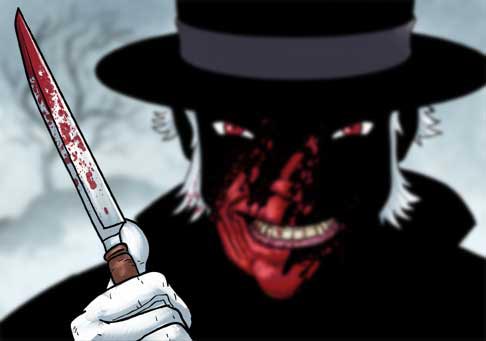
Holmes comes into view in the crosshairs of the sights of the device. He stands looking intently over the grassy knolls of the Great Grimpen Mire, across from the shooter, oblivious.
He wears an Inverness cape and a deer stalker, and in his mouth is clutched a briar pipe. In his hand he holds a magnifying glass.
Perhaps the perfection of the sight is what makes Oswald hesitate. His finger is on the trigger.
He hesitates.
His men are spread out along the route they thought Holmes would have to take. They are all lone gunmen now, the helicopter left back at the hall.
He hears and feels something land in the dip behind him.
He turns, not in time.
Professor Moriarty is upon him, silently, a long medical blade in his hand. He wears his opera cape. His top hat is on his head.
His gleaming eyes and wild grin shove themselves into Oswald's face. One huge, brutishly intelligent hand throws the technology aside. "Thank you," he tells Oswald, "for setting me free."
Oswald sees the blade enter him. There is no pain for such a long moment.
Not until Moriarty's hand jerks it expertly: back and to the left.
Author's Notes
Paul Cornell is a novelist and television writer, whose SF novels Something More and British Summertime have been published by Gollancz. He's written many episodes of British TV shows, including one for the upcoming series of Doctor Who. His comic strips include XTNCT in the 2000AD Megazine. He lives in Oxfordshire.
Paul has this to say about writing the story.
"I've always been fascinated with the gaps in the Sherlock Holmes stories, the stuff that we don't see about how Holmes functions as a real person. Conan Doyle, I think, realised that Holmes is one particularly attractive/ugly aspect of the male psyche made flesh, almost incapable of a complete literary life, and so suggested that Holmes 'switches off' between cases with his drugs, almost as if he really doesn't exist when one isn't reading about him.
Such figures may be only sustainable in their own settings, especially when that setting is a Victorian one. There, in its cliché version (a cliché born largely of the Holmes stories themselves) we can imagine such stark psyches might fit in, because of, oh, something about stiff upper lips, repression, etc., despite the fact that Watson is a trembling turmoil of all those huge male Victorian emotions. If we could look from a distance at what happens when Holmes is taken out of his setting, we might find the sight of it very funny or very disturbing, for what it says about the differences between his historical background and our own times, about what we want and need Holmes to be.
But we're generally still too much in the forest of post-Victorianism to do more than wince at the tree of say, Matt Frewer in a deerstalker.
I was pleased to see that the recent new Rupert Everett Holmes story on BBC1 engaged with some of this stuff, exploring Holmes as a real person in real time, and this story is my attempt to do the same thing."